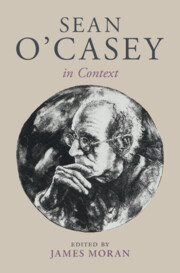Book contents
- Sean O’Casey in Context
- Sean O’Casey in Context
- Copyright page
- Contents
- Figures
- Tables
- Contributors
- Acknowledgements
- Sean O’Casey’s Life and Times: A Chronology
- Abbreviations
- Introduction
- Part I Key Places and Events
- Part II Social Contexts
- Part III Collaborators and Critics
- Chapter 16 W. B. Yeats
- Chapter 17 Lady Gregory
- Chapter 18 Bernard Shaw
- Chapter 19 Eileen Carey (Eileen O’Casey)
- Chapter 20 Tomás Mac Anna
- Chapter 21 Seamus Deane
- Chapter 22 Garry Hynes
- Chapter 23 Theatrical Emulators
- Part IV Performance Legacies
- Part V Non-Theatrical Writings
- Part VI Critical Understandings
- Further Reading
- Index
Chapter 21 - Seamus Deane
from Part III - Collaborators and Critics
Published online by Cambridge University Press: 23 June 2025
- Sean O’Casey in Context
- Sean O’Casey in Context
- Copyright page
- Contents
- Figures
- Tables
- Contributors
- Acknowledgements
- Sean O’Casey’s Life and Times: A Chronology
- Abbreviations
- Introduction
- Part I Key Places and Events
- Part II Social Contexts
- Part III Collaborators and Critics
- Chapter 16 W. B. Yeats
- Chapter 17 Lady Gregory
- Chapter 18 Bernard Shaw
- Chapter 19 Eileen Carey (Eileen O’Casey)
- Chapter 20 Tomás Mac Anna
- Chapter 21 Seamus Deane
- Chapter 22 Garry Hynes
- Chapter 23 Theatrical Emulators
- Part IV Performance Legacies
- Part V Non-Theatrical Writings
- Part VI Critical Understandings
- Further Reading
- Index
Summary
In the context of the appalling inter-communal violence and killings of Northern Ireland during the 1970s, Seamus Deane felt dismayed by those who found parallels between that situation and O’Casey’s Dublin trilogy. For Deane, O’Casey’s most famous works subject political ideologies to hostile scrutiny, whilst offering a form of sentimental humanism as the norm of the ‘ordinary’ people. This chapter examines how the views that Deane expressed about O’Casey fitted with Deane’s broader thinking about politics and society, and shows how Deane provided a telling critique that proved influential for O’Casey’s reputation, as well as for Irish literary and cultural studies more widely.
Keywords
Information
- Type
- Chapter
- Information
- Sean O'Casey in Context , pp. 222 - 232Publisher: Cambridge University PressPrint publication year: 2025
Accessibility standard: Inaccessible, or known limited accessibility
Why this information is here
This section outlines the accessibility features of this content - including support for screen readers, full keyboard navigation and high-contrast display options. This may not be relevant for you.Accessibility Information
Content Navigation
Allows you to navigate directly to chapters, sections, or non‐text items through a linked table of contents, reducing the need for extensive scrolling.
Provides an interactive index, letting you go straight to where a term or subject appears in the text without manual searching.
Reading Order & Textual Equivalents
You will encounter all content (including footnotes, captions, etc.) in a clear, sequential flow, making it easier to follow with assistive tools like screen readers.
Visual Accessibility
You will still understand key ideas or prompts without relying solely on colour, which is especially helpful if you have colour vision deficiencies.
